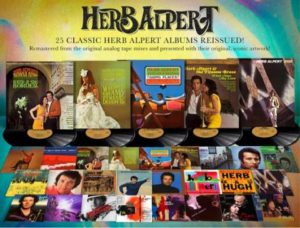HERB ALPERT COMING TO EUGENE
 Legendary trumpet player Herb Alpert, who created the “Tijuana Brass” sound that left an indelible mark on the music scene of the ‘60s and ‘70s, is coming to Eugene to play a one-night show in the Jaqua Concert Hall at the Shedd Institute on January 27, 2017.
Legendary trumpet player Herb Alpert, who created the “Tijuana Brass” sound that left an indelible mark on the music scene of the ‘60s and ‘70s, is coming to Eugene to play a one-night show in the Jaqua Concert Hall at the Shedd Institute on January 27, 2017.
A generous philanthropist and mentor to aspiring musicians, Alpert has offered to meet with a small group of jazz students from the University of Oregon’s School of Music and Dance before the show, to share some wisdom from his storied musical career.
“You certainly have to be really, really passionate about what you want to do in life, and if it’s music, you’ve got to understand that while you’re sleeping, other people are practicing that want the same thing you want,” Alpert said.
It’s a tough lesson that Alpert learned himself when he was drafted in 1952 and sent to Fort Knox, Kentucky to join an Army band with talented trumpet players from across the country.
“They could play higher and faster and some played better jazz, and I was thinking if I was ever going to be a professional, I’d have to come up with my own voice, my own sound, my own way of doing it, and that was my pursuit.”
Alpert said his breakthrough moment came after listening to pioneering jazz guitarist Les Paul and singer Mary Ford’s record “How High the Moon” in the late ‘50s.
“Les took his guitar and he was overdubbing it, you know, several times to get this kind of extraordinary sound,” Alpert said.
“So I had two tape machines in my little studio at home and I tried that with the trumpet. I went from one machine to the next and came up with this sound that actually was the genesis of the Tijuana Brass.”

Those early recordings formed the foundation of Alpert’s first album “The Lonely Bull,” which was inspired by the mariachi music he heard at a bullfight in Mexico on a trip across the border from his childhood home of Los Angeles. The record quickly rose to a spot on the Billboard Top 10 Chart.
“I got a letter from a lady in Germany who said, ‘Dear Mr. Alpert, thank you so much for taking me on this vicarious trip to Tijuana,’” Alpert said.
“I kind of chuckled when I read it and I thought, ‘Wow, that music was so visual for her that it transported her.’ And I said, ‘Well, that’s the type of music I’d like to make, music that takes you someplace.’”
“The Lonely Bull” was also the first release on the independent record label A&M that Alpert co-founded with business partner Jerry Moss in 1962, and marked the beginning of an extraordinarily successful career in the music industry.
Alpert went on to personally earn five number one hits, nine Grammy Awards, 15 Gold albums and sell 72 million records – at one point outselling the Beatles two to one. He was inducted into the Rock and Roll Hall of Fame in 2006.
His A&M record label helped launch the careers of other influential artists including Quincy Jones, Stan Getz, Cat Stevens, The Carpenters and The Police.

Alpert has used his financial success to become one of the most prominent patrons of music education on the West Coast, through his philanthropic non-profit The Herb Alpert Foundation, including major contributions to the UCLA Herb Alpert School of Music, as well as the Herb Alpert School of Music at Cal Arts, and most recently the Music Department at Los Angeles City College.
While Alpert is best known for his instrumental work, he’ll be joined on his latest tour by his wife Lani Hall, the former lead singer of Sergio Mendes’ groundbreaking group Brasil ’66 and winner of two Grammys of her own.
“She brings this Brazilian type of energy to the concerts,” said Alpert. “We’ve been doing this for the last 11 years and everybody seems to be pretty thrilled when they leave [our shows].”
Audiences should expect “a lot of improvisational type music” during Alpert’s one-night performance in Eugene on January 27.
“Night after night we’re playing just feelings, and within that we’ll play some Brazilian songs, some jazz, some pop songs, and then I’ll play a Tijuana Brass medley,” Alpert said.
Alpert said that his life’s goal today at age 81 is the same as it’s always been.
“I always wanted to make positive music,” Alpert said.
“I wanted to make uplifting music. Music that made you feel good when you play it and when you hear it. I always felt that if I could play something that makes me feel good, gives me a buzz when I’m playing, it might feel the same for the listener.”
